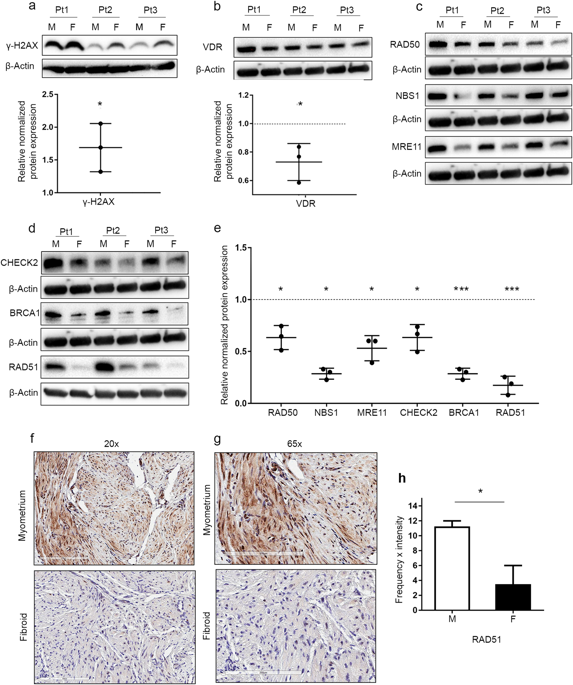当前位置:
X-MOL 学术
›
Acta Pharmacol. Sin.
›
论文详情
Our official English website, www.x-mol.net, welcomes your
feedback! (Note: you will need to create a separate account there.)
Hypovitaminosis D exacerbates the DNA damage load in human uterine fibroids, which is ameliorated by vitamin D3 treatment.
Acta Pharmacologica Sinica ( IF 6.9 ) Pub Date : 2018-11-26 , DOI: 10.1038/s41401-018-0184-6 Mohamed Ali 1, 2 , Sara Mahmoud Shahin 2 , Nagwa Ali Sabri 2 , Ayman Al-Hendy 1 , Qiwei Yang 1
Acta Pharmacologica Sinica ( IF 6.9 ) Pub Date : 2018-11-26 , DOI: 10.1038/s41401-018-0184-6 Mohamed Ali 1, 2 , Sara Mahmoud Shahin 2 , Nagwa Ali Sabri 2 , Ayman Al-Hendy 1 , Qiwei Yang 1
Affiliation

|
Uterine fibroids (UFs) are the most common benign neoplastic threat to women's health and associated with DNA damage and genomic instability. Hypovitaminosis D is a known risk factor for UFs, especially among African Americans. Vitamin D3 has been shown to effectively inhibit UF phenotype, but its mechanisms remain unclear. We hypothesize that Vitamin D3 ameliorates UFs by recovering the damaged DNA repair system, thus inhibits tumor progression. We compared the DNA damage status and Vitamin D receptor (VDR) expression between normal myometrial and UF primary cells. Unrepaired DNA double-strand breaks (DSBs) accumulated but VDR expression decreased in UFs. The RNA and protein levels of key DNA repair members belonging to DNA DSB sensors (MRE11, NBS1, RAD50), mediators and effectors (CHECK2, BRCA1, RAD51) were downregulated in UFs compared with myometrial cells. VDR KD induced DSB accumulation and DNA damage response (DDR) defects in myometrial cells. Using the DNA damage PCR array, the expression of many additional DNA repair genes was downregulated in VDR KD cells. Treatment of UF cells with Vitamin D3 (100 nM) significantly decreased DNA damage and restored DDR concomitant with VDR induction. Notably, the PCR array demonstrated that among 75 downregulated genes after VDR KD, 67 (89.3%) were upregulated after vitamin D3 treatment. These studies demonstrate a novel link between DNA damage and the vitamin D3/VDR axis in UFs. Vitamin D3 suppresses the UF phenotype through orchestrated targeting at multiple molecules in DNA repair pathways, thus offering novel mechanistic insights into the clinical effectiveness of vitamin D3 on UFs.
中文翻译:

维生素 D 缺乏症会加剧人类子宫肌瘤的 DNA 损伤负荷,而维生素 D3 治疗可改善这种情况。
子宫肌瘤 (UFs) 是对女性健康最常见的良性肿瘤威胁,与 DNA 损伤和基因组不稳定性有关。维生素 D 不足是 UF 的已知危险因素,尤其是在非裔美国人中。维生素 D3 已被证明可有效抑制 UF 表型,但其机制尚不清楚。我们假设维生素 D3 通过恢复受损的 DNA 修复系统来改善 UF,从而抑制肿瘤进展。我们比较了正常子宫肌层和 UF 原代细胞之间的 DNA 损伤状态和维生素 D 受体 (VDR) 表达。未修复的 DNA 双链断裂 (DSB) 累积,但 VDR 表达在 UF 中下降。属于 DNA DSB 传感器(MRE11、NBS1、RAD50)、介质和效应器(CHECK2、BRCA1、与子宫肌层细胞相比,RAD51) 在 UF 中下调。VDR KD 在子宫肌层细胞中诱导 DSB 积累和 DNA 损伤反应 (DDR) 缺陷。使用 DNA 损伤 PCR 阵列,许多额外 DNA 修复基因的表达在 VDR KD 细胞中被下调。用维生素 D3 (100 nM) 处理 UF 细胞显着减少了 DNA 损伤并恢复了伴随 VDR 诱导的 DDR。值得注意的是,PCR 阵列表明,在 VDR KD 后的 75 个下调基因中,67 个(89.3%)在维生素 D3 处理后上调。这些研究证明了 UF 中 DNA 损伤与维生素 D3/VDR 轴之间的新联系。维生素 D3 通过协调靶向 DNA 修复途径中的多个分子来抑制 UF 表型,从而为维生素 D3 对 UF 的临床有效性提供新的机制见解。
更新日期:2019-05-16
中文翻译:

维生素 D 缺乏症会加剧人类子宫肌瘤的 DNA 损伤负荷,而维生素 D3 治疗可改善这种情况。
子宫肌瘤 (UFs) 是对女性健康最常见的良性肿瘤威胁,与 DNA 损伤和基因组不稳定性有关。维生素 D 不足是 UF 的已知危险因素,尤其是在非裔美国人中。维生素 D3 已被证明可有效抑制 UF 表型,但其机制尚不清楚。我们假设维生素 D3 通过恢复受损的 DNA 修复系统来改善 UF,从而抑制肿瘤进展。我们比较了正常子宫肌层和 UF 原代细胞之间的 DNA 损伤状态和维生素 D 受体 (VDR) 表达。未修复的 DNA 双链断裂 (DSB) 累积,但 VDR 表达在 UF 中下降。属于 DNA DSB 传感器(MRE11、NBS1、RAD50)、介质和效应器(CHECK2、BRCA1、与子宫肌层细胞相比,RAD51) 在 UF 中下调。VDR KD 在子宫肌层细胞中诱导 DSB 积累和 DNA 损伤反应 (DDR) 缺陷。使用 DNA 损伤 PCR 阵列,许多额外 DNA 修复基因的表达在 VDR KD 细胞中被下调。用维生素 D3 (100 nM) 处理 UF 细胞显着减少了 DNA 损伤并恢复了伴随 VDR 诱导的 DDR。值得注意的是,PCR 阵列表明,在 VDR KD 后的 75 个下调基因中,67 个(89.3%)在维生素 D3 处理后上调。这些研究证明了 UF 中 DNA 损伤与维生素 D3/VDR 轴之间的新联系。维生素 D3 通过协调靶向 DNA 修复途径中的多个分子来抑制 UF 表型,从而为维生素 D3 对 UF 的临床有效性提供新的机制见解。











































 京公网安备 11010802027423号
京公网安备 11010802027423号